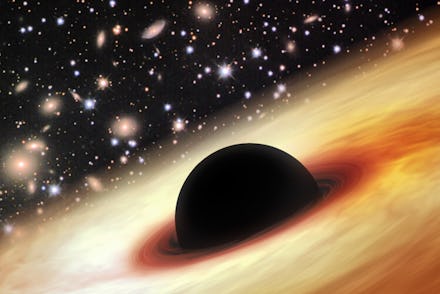Scientists Just Discovered a Black Hole 12 Billion Times More Massive Than the Sun

Black holes are terrifyingly nebulous amalgamations of space matter and darkness. Their gravitational pull is said to be so strong that nothing — not light, not matter, not massive celestial bodies — can escape their clutches, and their very existence can warp space and time.
Luckily for all the space nerds and neurotics out there, a team of scientists from around the globe recently spotted a new black hole, and it's a doozy. It may have the wildly unexciting name of SDSS J0100+2802, but don't let that fool you: This black hole is 12 billion times more massive than our sun, making it one of the most massive black holes ever recorded.
The study, published in Nature, reported that the big guy is currently hanging out in the middle of a quasar, which is an intensely bright and powerful galactic region typically found in the center of a galaxy. Quasars source their luminosity from their black hole friends — according to NASA, "as material spirals into the black holes, a large part of the mass is converted to energy," which yields a blinding amount of light.
This light helped scientists measure J0100+2802's staggeringly large size.
"Using spectroscopy, we can detect the emission of light surrounding black holes, then we can use the properties of this gas and the distance of this gas to estimate the mass of the black hole," Xue-Bing Wu, the study's lead researcher, told Popular Science.
But the intrigue doesn't end there. The study noted that J0100+2802 was born a mere 900 million years after the Big Bang. As the Guardian pointed out, "astronomers cannot explain how such an enormous black hole could have formed so early in cosmic history, soon after the first stars and galaxies emerged."
Xiaohui Fan, a professor of astronomy at the University of Arizona's Steward Observatory, didn't do much to assuage our creeping feelings of ignorance and inconsequentialness.
"How can a quasar so luminous, and a black hole so massive, form so early in the history of the universe, at an era soon after the earliest stars and galaxies have just emerged?" he asked, according to a press release from the University of Arizona, which co-led the team with researchers from the University of Peking. "And what is the relationship between this monster black hole and its surrounding environment, including its host galaxy?"
Luckily Bram Venemans, an astronomer at the Max Planck Institute who provided commentary on the study, provided a possible explanation. "This black hole must have grown close to a maximum rate for most of its lifetime without the growth being stopped by energy output," he said, according to Popular Science. "It's still in the limits of what's possible. It's just surprising that it happened so efficiently over such a long time."
Hooray! Problem solved.
Except not at all. J0100+2802 is just one of a multitude of black holes, and when it comes down to it, they're pretty much still a mystery. In fact, Steven Hawking recently argued that black holes are a dirty, rotten lie, and don't exist at all, at least when it comes to how we've conceptualized them thus far.
At the heart of the conundrum? A tiny battle between Einstein's theory of general relativity and quantum physics.
National Geographic lays out the existential crisis-inducing problem:
"The conventional view of black holes posits that their gravitational pull is so powerful that nothing can escape from them — not even light, which is why they're called black holes. The boundary past which there is supposedly no return is known as the event horizon.
In other words, if we take Einstein's famed theory at face value, then black holes can be equated to monsters that eat up everything in sight and let nothing escape. Yet according to quantum physics, which gave us the Standard Model of physics and includes 17 particles and four forces, this isn't possible: If something enters a black hole, it should also be able to leave.
In sum: You know what's scarier than a giant, scary galactic body that seemingly destroys anything that comes near it? A giant, scary galactic body whose very existence stumps even the world's smartest physicists.
Luckily for us earthlings, the black holes we've discovered are far enough away that they don't pose any major threat to our physical well-being. (Our psyche, on the other hand, is another matter.)
But before all this space-talk gets you down, just remember that we're so small relative to more or less everything else in the universe that none of this really matters anyway. Besides, as Neil deGrasse Tyson, everyone's favorite planet-loving physicist, once said, being devoured by a black hole would be "the most spectacular way to die in space."